Challenges and approaches to Development
VerifiedAdded on 2023/06/15
|11
|3754
|337
AI Summary
This article discusses the challenges and opportunities faced by the United Kingdom in terms of poverty, inequality, and economy. It also provides a critical review of Rostow’s Stages of Theory and a report on World Bank's approach to relieving poverty.
Contribute Materials
Your contribution can guide someone’s learning journey. Share your
documents today.
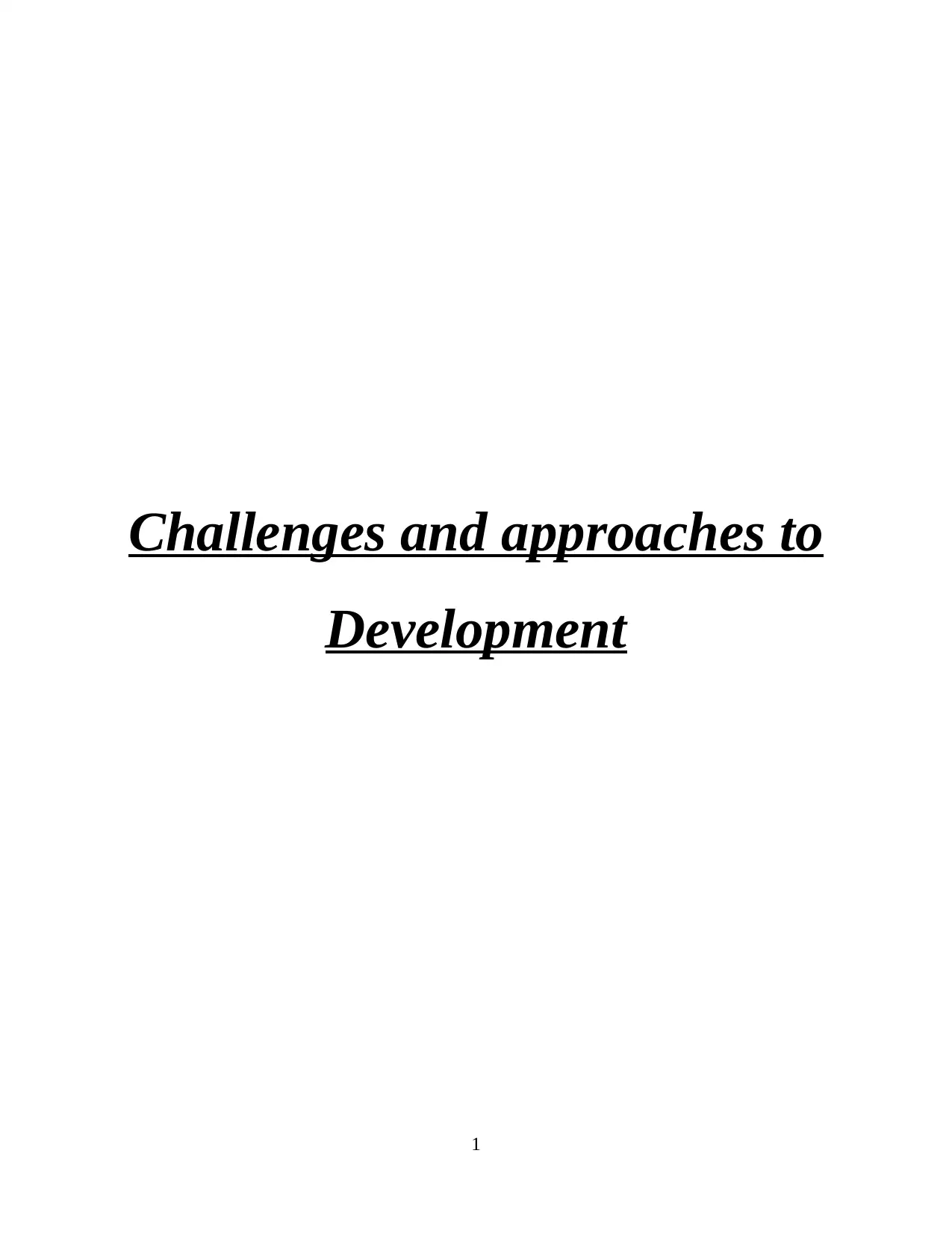
Challenges and approaches to
Development
1
Development
1
Secure Best Marks with AI Grader
Need help grading? Try our AI Grader for instant feedback on your assignments.
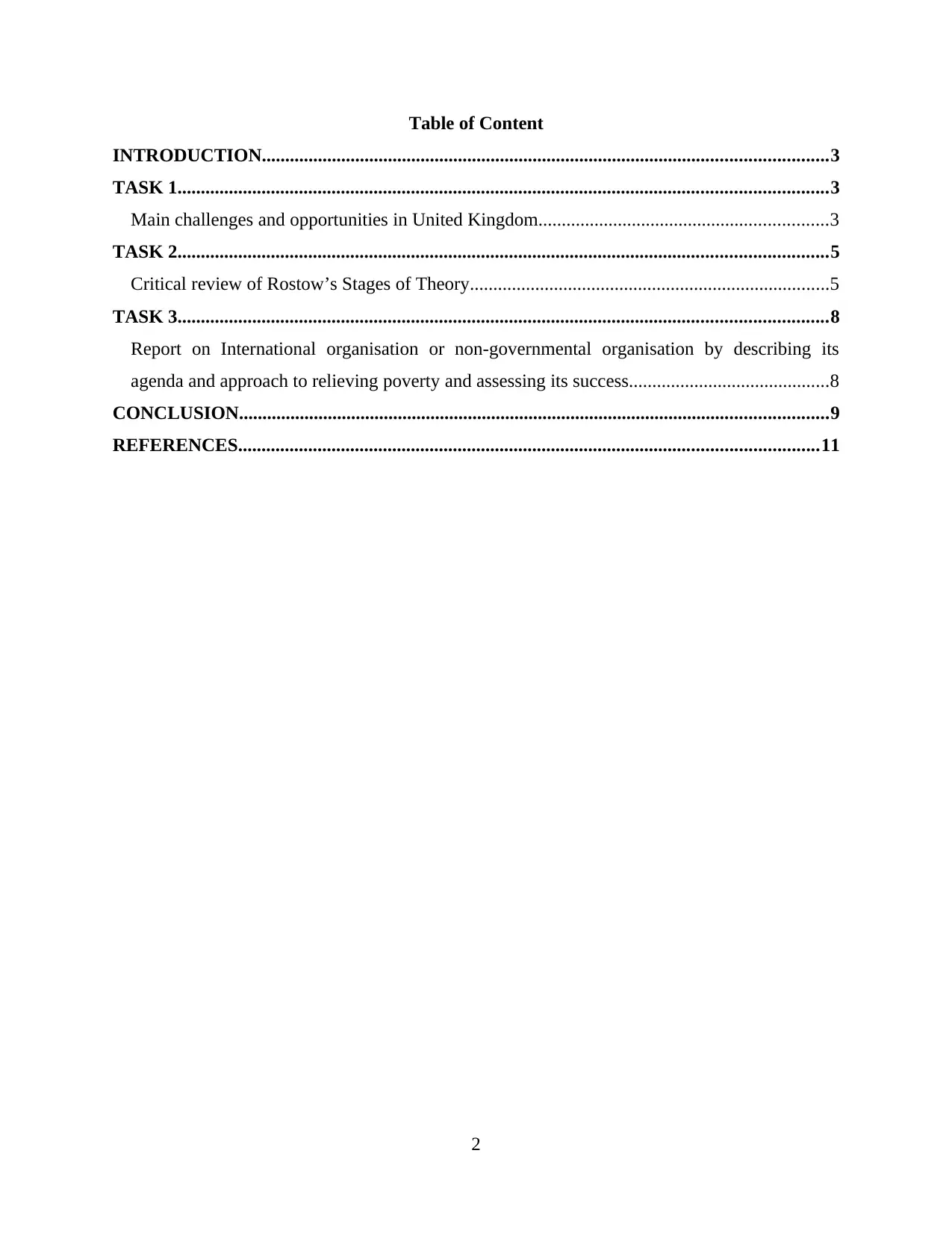
Table of Content
INTRODUCTION.........................................................................................................................3
TASK 1...........................................................................................................................................3
Main challenges and opportunities in United Kingdom..............................................................3
TASK 2...........................................................................................................................................5
Critical review of Rostow’s Stages of Theory.............................................................................5
TASK 3...........................................................................................................................................8
Report on International organisation or non-governmental organisation by describing its
agenda and approach to relieving poverty and assessing its success...........................................8
CONCLUSION..............................................................................................................................9
REFERENCES............................................................................................................................11
2
INTRODUCTION.........................................................................................................................3
TASK 1...........................................................................................................................................3
Main challenges and opportunities in United Kingdom..............................................................3
TASK 2...........................................................................................................................................5
Critical review of Rostow’s Stages of Theory.............................................................................5
TASK 3...........................................................................................................................................8
Report on International organisation or non-governmental organisation by describing its
agenda and approach to relieving poverty and assessing its success...........................................8
CONCLUSION..............................................................................................................................9
REFERENCES............................................................................................................................11
2
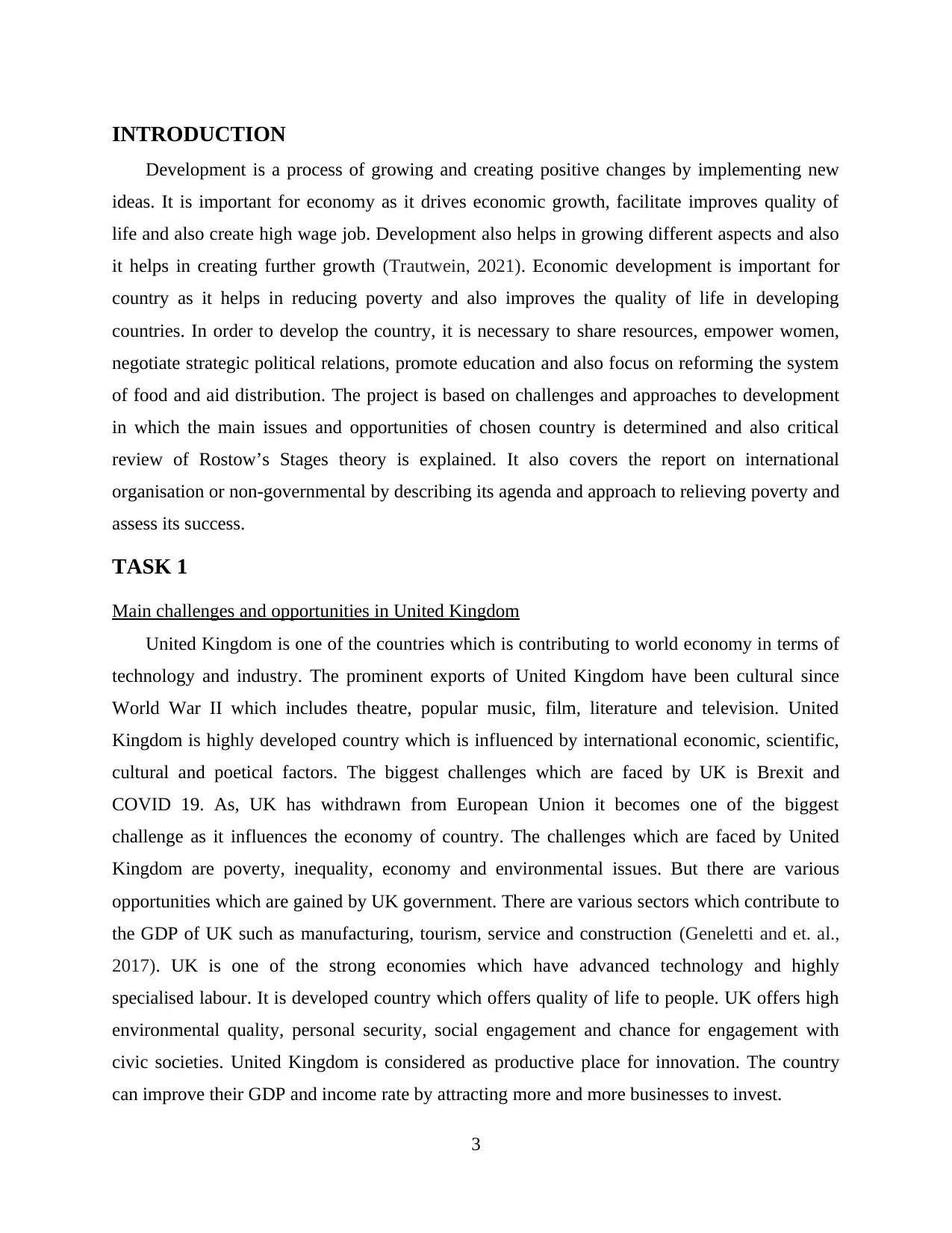
INTRODUCTION
Development is a process of growing and creating positive changes by implementing new
ideas. It is important for economy as it drives economic growth, facilitate improves quality of
life and also create high wage job. Development also helps in growing different aspects and also
it helps in creating further growth (Trautwein, 2021). Economic development is important for
country as it helps in reducing poverty and also improves the quality of life in developing
countries. In order to develop the country, it is necessary to share resources, empower women,
negotiate strategic political relations, promote education and also focus on reforming the system
of food and aid distribution. The project is based on challenges and approaches to development
in which the main issues and opportunities of chosen country is determined and also critical
review of Rostow’s Stages theory is explained. It also covers the report on international
organisation or non-governmental by describing its agenda and approach to relieving poverty and
assess its success.
TASK 1
Main challenges and opportunities in United Kingdom
United Kingdom is one of the countries which is contributing to world economy in terms of
technology and industry. The prominent exports of United Kingdom have been cultural since
World War II which includes theatre, popular music, film, literature and television. United
Kingdom is highly developed country which is influenced by international economic, scientific,
cultural and poetical factors. The biggest challenges which are faced by UK is Brexit and
COVID 19. As, UK has withdrawn from European Union it becomes one of the biggest
challenge as it influences the economy of country. The challenges which are faced by United
Kingdom are poverty, inequality, economy and environmental issues. But there are various
opportunities which are gained by UK government. There are various sectors which contribute to
the GDP of UK such as manufacturing, tourism, service and construction (Geneletti and et. al.,
2017). UK is one of the strong economies which have advanced technology and highly
specialised labour. It is developed country which offers quality of life to people. UK offers high
environmental quality, personal security, social engagement and chance for engagement with
civic societies. United Kingdom is considered as productive place for innovation. The country
can improve their GDP and income rate by attracting more and more businesses to invest.
3
Development is a process of growing and creating positive changes by implementing new
ideas. It is important for economy as it drives economic growth, facilitate improves quality of
life and also create high wage job. Development also helps in growing different aspects and also
it helps in creating further growth (Trautwein, 2021). Economic development is important for
country as it helps in reducing poverty and also improves the quality of life in developing
countries. In order to develop the country, it is necessary to share resources, empower women,
negotiate strategic political relations, promote education and also focus on reforming the system
of food and aid distribution. The project is based on challenges and approaches to development
in which the main issues and opportunities of chosen country is determined and also critical
review of Rostow’s Stages theory is explained. It also covers the report on international
organisation or non-governmental by describing its agenda and approach to relieving poverty and
assess its success.
TASK 1
Main challenges and opportunities in United Kingdom
United Kingdom is one of the countries which is contributing to world economy in terms of
technology and industry. The prominent exports of United Kingdom have been cultural since
World War II which includes theatre, popular music, film, literature and television. United
Kingdom is highly developed country which is influenced by international economic, scientific,
cultural and poetical factors. The biggest challenges which are faced by UK is Brexit and
COVID 19. As, UK has withdrawn from European Union it becomes one of the biggest
challenge as it influences the economy of country. The challenges which are faced by United
Kingdom are poverty, inequality, economy and environmental issues. But there are various
opportunities which are gained by UK government. There are various sectors which contribute to
the GDP of UK such as manufacturing, tourism, service and construction (Geneletti and et. al.,
2017). UK is one of the strong economies which have advanced technology and highly
specialised labour. It is developed country which offers quality of life to people. UK offers high
environmental quality, personal security, social engagement and chance for engagement with
civic societies. United Kingdom is considered as productive place for innovation. The country
can improve their GDP and income rate by attracting more and more businesses to invest.
3
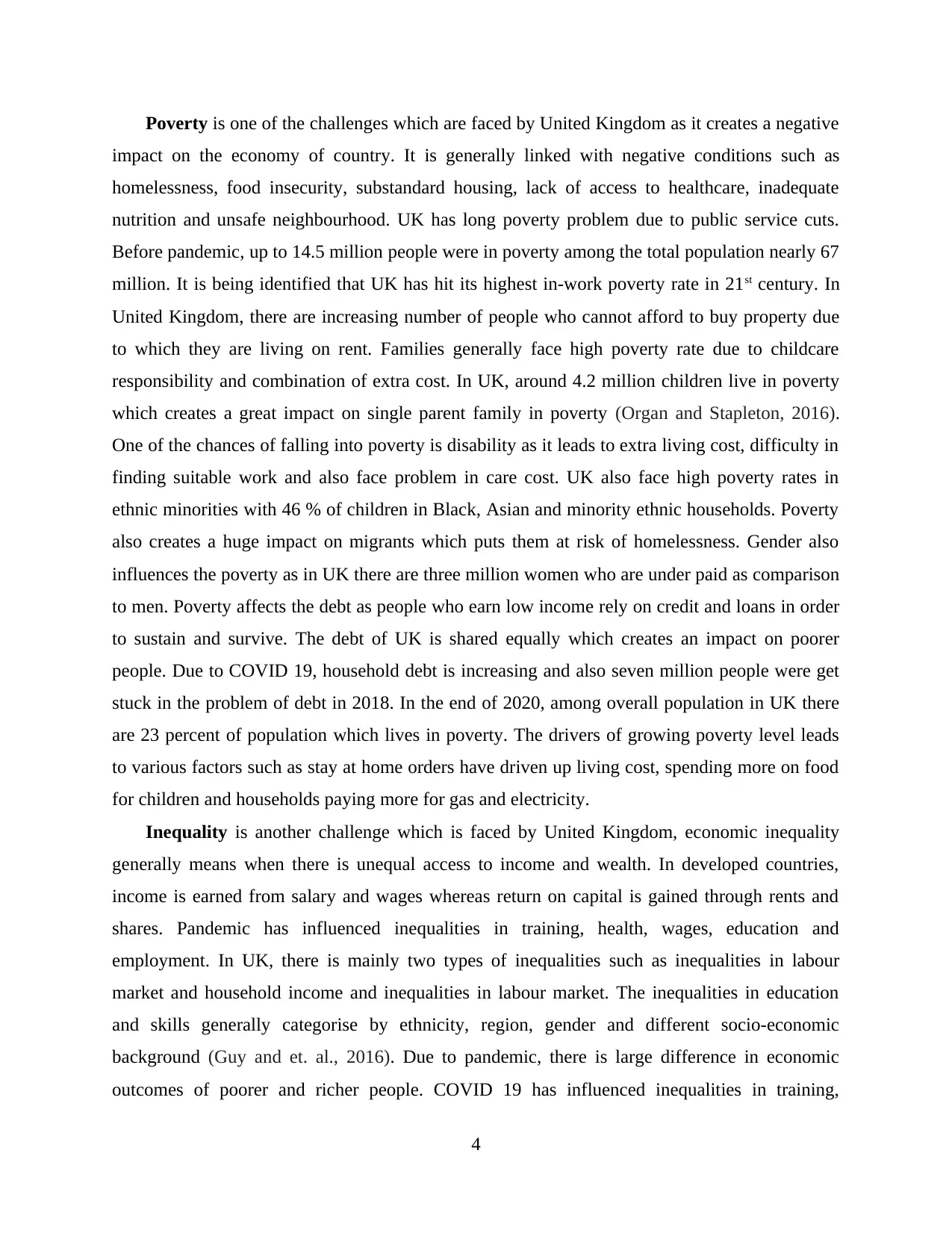
Poverty is one of the challenges which are faced by United Kingdom as it creates a negative
impact on the economy of country. It is generally linked with negative conditions such as
homelessness, food insecurity, substandard housing, lack of access to healthcare, inadequate
nutrition and unsafe neighbourhood. UK has long poverty problem due to public service cuts.
Before pandemic, up to 14.5 million people were in poverty among the total population nearly 67
million. It is being identified that UK has hit its highest in-work poverty rate in 21st century. In
United Kingdom, there are increasing number of people who cannot afford to buy property due
to which they are living on rent. Families generally face high poverty rate due to childcare
responsibility and combination of extra cost. In UK, around 4.2 million children live in poverty
which creates a great impact on single parent family in poverty (Organ and Stapleton, 2016).
One of the chances of falling into poverty is disability as it leads to extra living cost, difficulty in
finding suitable work and also face problem in care cost. UK also face high poverty rates in
ethnic minorities with 46 % of children in Black, Asian and minority ethnic households. Poverty
also creates a huge impact on migrants which puts them at risk of homelessness. Gender also
influences the poverty as in UK there are three million women who are under paid as comparison
to men. Poverty affects the debt as people who earn low income rely on credit and loans in order
to sustain and survive. The debt of UK is shared equally which creates an impact on poorer
people. Due to COVID 19, household debt is increasing and also seven million people were get
stuck in the problem of debt in 2018. In the end of 2020, among overall population in UK there
are 23 percent of population which lives in poverty. The drivers of growing poverty level leads
to various factors such as stay at home orders have driven up living cost, spending more on food
for children and households paying more for gas and electricity.
Inequality is another challenge which is faced by United Kingdom, economic inequality
generally means when there is unequal access to income and wealth. In developed countries,
income is earned from salary and wages whereas return on capital is gained through rents and
shares. Pandemic has influenced inequalities in training, health, wages, education and
employment. In UK, there is mainly two types of inequalities such as inequalities in labour
market and household income and inequalities in labour market. The inequalities in education
and skills generally categorise by ethnicity, region, gender and different socio-economic
background (Guy and et. al., 2016). Due to pandemic, there is large difference in economic
outcomes of poorer and richer people. COVID 19 has influenced inequalities in training,
4
impact on the economy of country. It is generally linked with negative conditions such as
homelessness, food insecurity, substandard housing, lack of access to healthcare, inadequate
nutrition and unsafe neighbourhood. UK has long poverty problem due to public service cuts.
Before pandemic, up to 14.5 million people were in poverty among the total population nearly 67
million. It is being identified that UK has hit its highest in-work poverty rate in 21st century. In
United Kingdom, there are increasing number of people who cannot afford to buy property due
to which they are living on rent. Families generally face high poverty rate due to childcare
responsibility and combination of extra cost. In UK, around 4.2 million children live in poverty
which creates a great impact on single parent family in poverty (Organ and Stapleton, 2016).
One of the chances of falling into poverty is disability as it leads to extra living cost, difficulty in
finding suitable work and also face problem in care cost. UK also face high poverty rates in
ethnic minorities with 46 % of children in Black, Asian and minority ethnic households. Poverty
also creates a huge impact on migrants which puts them at risk of homelessness. Gender also
influences the poverty as in UK there are three million women who are under paid as comparison
to men. Poverty affects the debt as people who earn low income rely on credit and loans in order
to sustain and survive. The debt of UK is shared equally which creates an impact on poorer
people. Due to COVID 19, household debt is increasing and also seven million people were get
stuck in the problem of debt in 2018. In the end of 2020, among overall population in UK there
are 23 percent of population which lives in poverty. The drivers of growing poverty level leads
to various factors such as stay at home orders have driven up living cost, spending more on food
for children and households paying more for gas and electricity.
Inequality is another challenge which is faced by United Kingdom, economic inequality
generally means when there is unequal access to income and wealth. In developed countries,
income is earned from salary and wages whereas return on capital is gained through rents and
shares. Pandemic has influenced inequalities in training, health, wages, education and
employment. In UK, there is mainly two types of inequalities such as inequalities in labour
market and household income and inequalities in labour market. The inequalities in education
and skills generally categorise by ethnicity, region, gender and different socio-economic
background (Guy and et. al., 2016). Due to pandemic, there is large difference in economic
outcomes of poorer and richer people. COVID 19 has influenced inequalities in training,
4
Paraphrase This Document
Need a fresh take? Get an instant paraphrase of this document with our AI Paraphraser
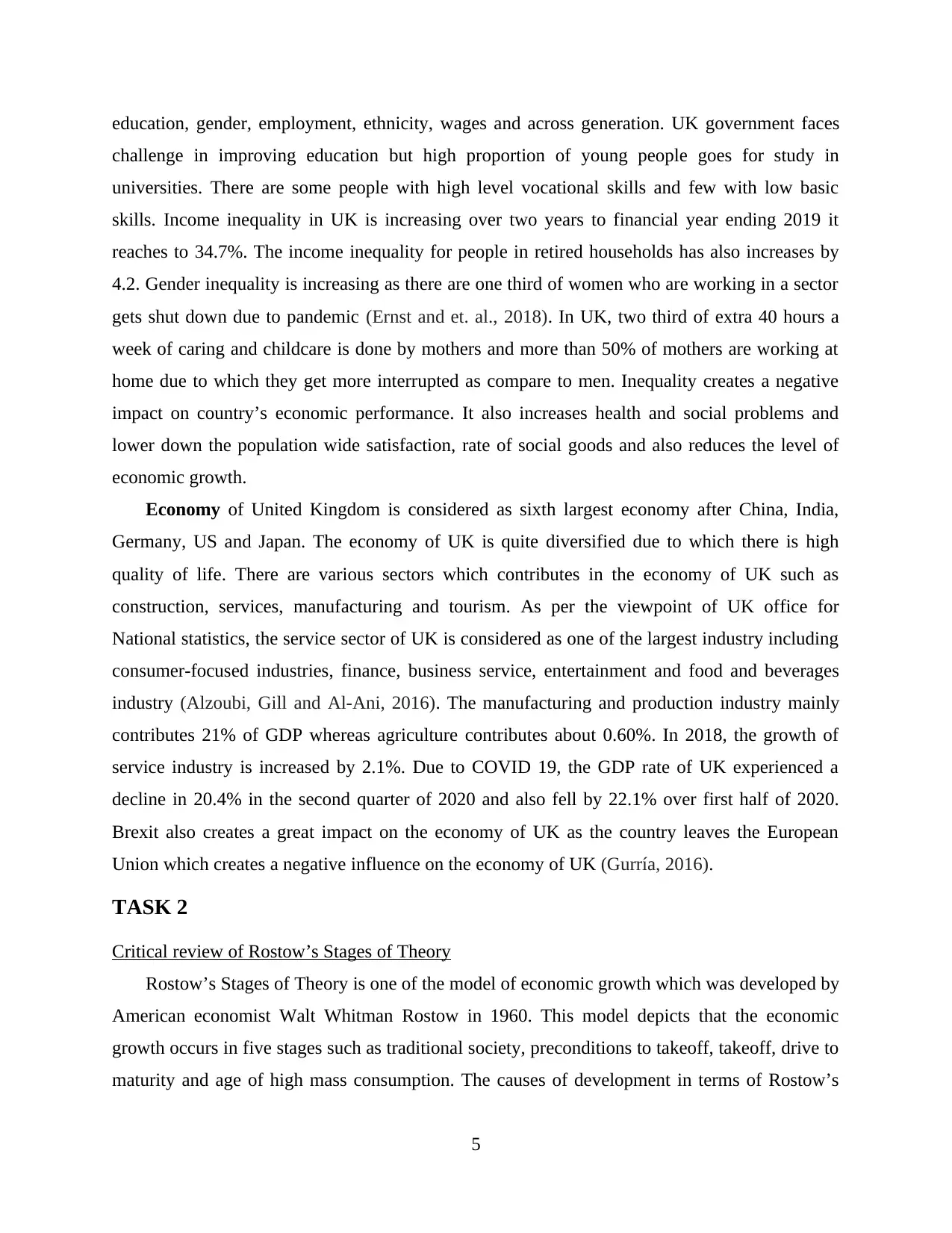
education, gender, employment, ethnicity, wages and across generation. UK government faces
challenge in improving education but high proportion of young people goes for study in
universities. There are some people with high level vocational skills and few with low basic
skills. Income inequality in UK is increasing over two years to financial year ending 2019 it
reaches to 34.7%. The income inequality for people in retired households has also increases by
4.2. Gender inequality is increasing as there are one third of women who are working in a sector
gets shut down due to pandemic (Ernst and et. al., 2018). In UK, two third of extra 40 hours a
week of caring and childcare is done by mothers and more than 50% of mothers are working at
home due to which they get more interrupted as compare to men. Inequality creates a negative
impact on country’s economic performance. It also increases health and social problems and
lower down the population wide satisfaction, rate of social goods and also reduces the level of
economic growth.
Economy of United Kingdom is considered as sixth largest economy after China, India,
Germany, US and Japan. The economy of UK is quite diversified due to which there is high
quality of life. There are various sectors which contributes in the economy of UK such as
construction, services, manufacturing and tourism. As per the viewpoint of UK office for
National statistics, the service sector of UK is considered as one of the largest industry including
consumer-focused industries, finance, business service, entertainment and food and beverages
industry (Alzoubi, Gill and Al-Ani, 2016). The manufacturing and production industry mainly
contributes 21% of GDP whereas agriculture contributes about 0.60%. In 2018, the growth of
service industry is increased by 2.1%. Due to COVID 19, the GDP rate of UK experienced a
decline in 20.4% in the second quarter of 2020 and also fell by 22.1% over first half of 2020.
Brexit also creates a great impact on the economy of UK as the country leaves the European
Union which creates a negative influence on the economy of UK (Gurría, 2016).
TASK 2
Critical review of Rostow’s Stages of Theory
Rostow’s Stages of Theory is one of the model of economic growth which was developed by
American economist Walt Whitman Rostow in 1960. This model depicts that the economic
growth occurs in five stages such as traditional society, preconditions to takeoff, takeoff, drive to
maturity and age of high mass consumption. The causes of development in terms of Rostow’s
5
challenge in improving education but high proportion of young people goes for study in
universities. There are some people with high level vocational skills and few with low basic
skills. Income inequality in UK is increasing over two years to financial year ending 2019 it
reaches to 34.7%. The income inequality for people in retired households has also increases by
4.2. Gender inequality is increasing as there are one third of women who are working in a sector
gets shut down due to pandemic (Ernst and et. al., 2018). In UK, two third of extra 40 hours a
week of caring and childcare is done by mothers and more than 50% of mothers are working at
home due to which they get more interrupted as compare to men. Inequality creates a negative
impact on country’s economic performance. It also increases health and social problems and
lower down the population wide satisfaction, rate of social goods and also reduces the level of
economic growth.
Economy of United Kingdom is considered as sixth largest economy after China, India,
Germany, US and Japan. The economy of UK is quite diversified due to which there is high
quality of life. There are various sectors which contributes in the economy of UK such as
construction, services, manufacturing and tourism. As per the viewpoint of UK office for
National statistics, the service sector of UK is considered as one of the largest industry including
consumer-focused industries, finance, business service, entertainment and food and beverages
industry (Alzoubi, Gill and Al-Ani, 2016). The manufacturing and production industry mainly
contributes 21% of GDP whereas agriculture contributes about 0.60%. In 2018, the growth of
service industry is increased by 2.1%. Due to COVID 19, the GDP rate of UK experienced a
decline in 20.4% in the second quarter of 2020 and also fell by 22.1% over first half of 2020.
Brexit also creates a great impact on the economy of UK as the country leaves the European
Union which creates a negative influence on the economy of UK (Gurría, 2016).
TASK 2
Critical review of Rostow’s Stages of Theory
Rostow’s Stages of Theory is one of the model of economic growth which was developed by
American economist Walt Whitman Rostow in 1960. This model depicts that the economic
growth occurs in five stages such as traditional society, preconditions to takeoff, takeoff, drive to
maturity and age of high mass consumption. The causes of development in terms of Rostow’s
5
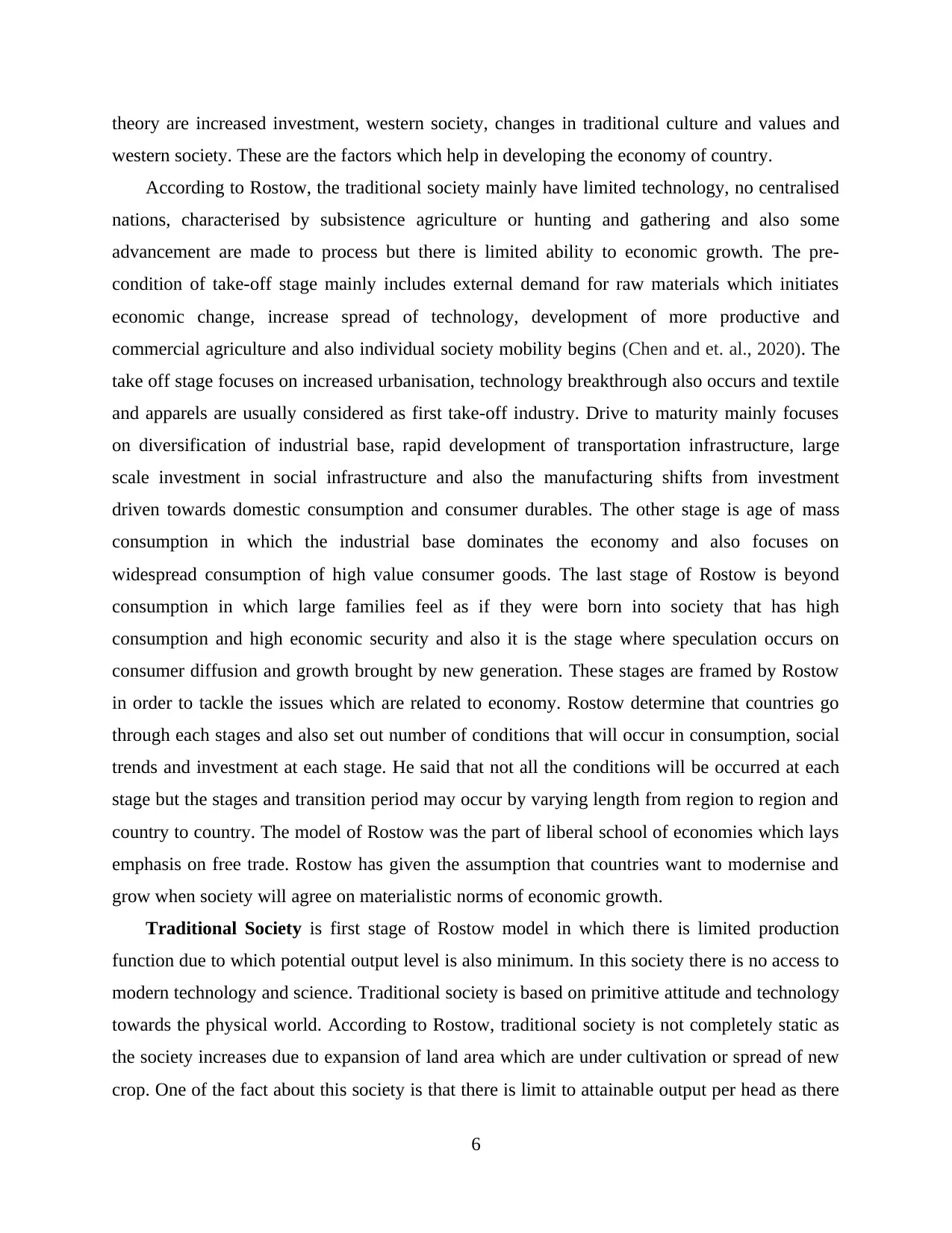
theory are increased investment, western society, changes in traditional culture and values and
western society. These are the factors which help in developing the economy of country.
According to Rostow, the traditional society mainly have limited technology, no centralised
nations, characterised by subsistence agriculture or hunting and gathering and also some
advancement are made to process but there is limited ability to economic growth. The pre-
condition of take-off stage mainly includes external demand for raw materials which initiates
economic change, increase spread of technology, development of more productive and
commercial agriculture and also individual society mobility begins (Chen and et. al., 2020). The
take off stage focuses on increased urbanisation, technology breakthrough also occurs and textile
and apparels are usually considered as first take-off industry. Drive to maturity mainly focuses
on diversification of industrial base, rapid development of transportation infrastructure, large
scale investment in social infrastructure and also the manufacturing shifts from investment
driven towards domestic consumption and consumer durables. The other stage is age of mass
consumption in which the industrial base dominates the economy and also focuses on
widespread consumption of high value consumer goods. The last stage of Rostow is beyond
consumption in which large families feel as if they were born into society that has high
consumption and high economic security and also it is the stage where speculation occurs on
consumer diffusion and growth brought by new generation. These stages are framed by Rostow
in order to tackle the issues which are related to economy. Rostow determine that countries go
through each stages and also set out number of conditions that will occur in consumption, social
trends and investment at each stage. He said that not all the conditions will be occurred at each
stage but the stages and transition period may occur by varying length from region to region and
country to country. The model of Rostow was the part of liberal school of economies which lays
emphasis on free trade. Rostow has given the assumption that countries want to modernise and
grow when society will agree on materialistic norms of economic growth.
Traditional Society is first stage of Rostow model in which there is limited production
function due to which potential output level is also minimum. In this society there is no access to
modern technology and science. Traditional society is based on primitive attitude and technology
towards the physical world. According to Rostow, traditional society is not completely static as
the society increases due to expansion of land area which are under cultivation or spread of new
crop. One of the fact about this society is that there is limit to attainable output per head as there
6
western society. These are the factors which help in developing the economy of country.
According to Rostow, the traditional society mainly have limited technology, no centralised
nations, characterised by subsistence agriculture or hunting and gathering and also some
advancement are made to process but there is limited ability to economic growth. The pre-
condition of take-off stage mainly includes external demand for raw materials which initiates
economic change, increase spread of technology, development of more productive and
commercial agriculture and also individual society mobility begins (Chen and et. al., 2020). The
take off stage focuses on increased urbanisation, technology breakthrough also occurs and textile
and apparels are usually considered as first take-off industry. Drive to maturity mainly focuses
on diversification of industrial base, rapid development of transportation infrastructure, large
scale investment in social infrastructure and also the manufacturing shifts from investment
driven towards domestic consumption and consumer durables. The other stage is age of mass
consumption in which the industrial base dominates the economy and also focuses on
widespread consumption of high value consumer goods. The last stage of Rostow is beyond
consumption in which large families feel as if they were born into society that has high
consumption and high economic security and also it is the stage where speculation occurs on
consumer diffusion and growth brought by new generation. These stages are framed by Rostow
in order to tackle the issues which are related to economy. Rostow determine that countries go
through each stages and also set out number of conditions that will occur in consumption, social
trends and investment at each stage. He said that not all the conditions will be occurred at each
stage but the stages and transition period may occur by varying length from region to region and
country to country. The model of Rostow was the part of liberal school of economies which lays
emphasis on free trade. Rostow has given the assumption that countries want to modernise and
grow when society will agree on materialistic norms of economic growth.
Traditional Society is first stage of Rostow model in which there is limited production
function due to which potential output level is also minimum. In this society there is no access to
modern technology and science. Traditional society is based on primitive attitude and technology
towards the physical world. According to Rostow, traditional society is not completely static as
the society increases due to expansion of land area which are under cultivation or spread of new
crop. One of the fact about this society is that there is limit to attainable output per head as there
6
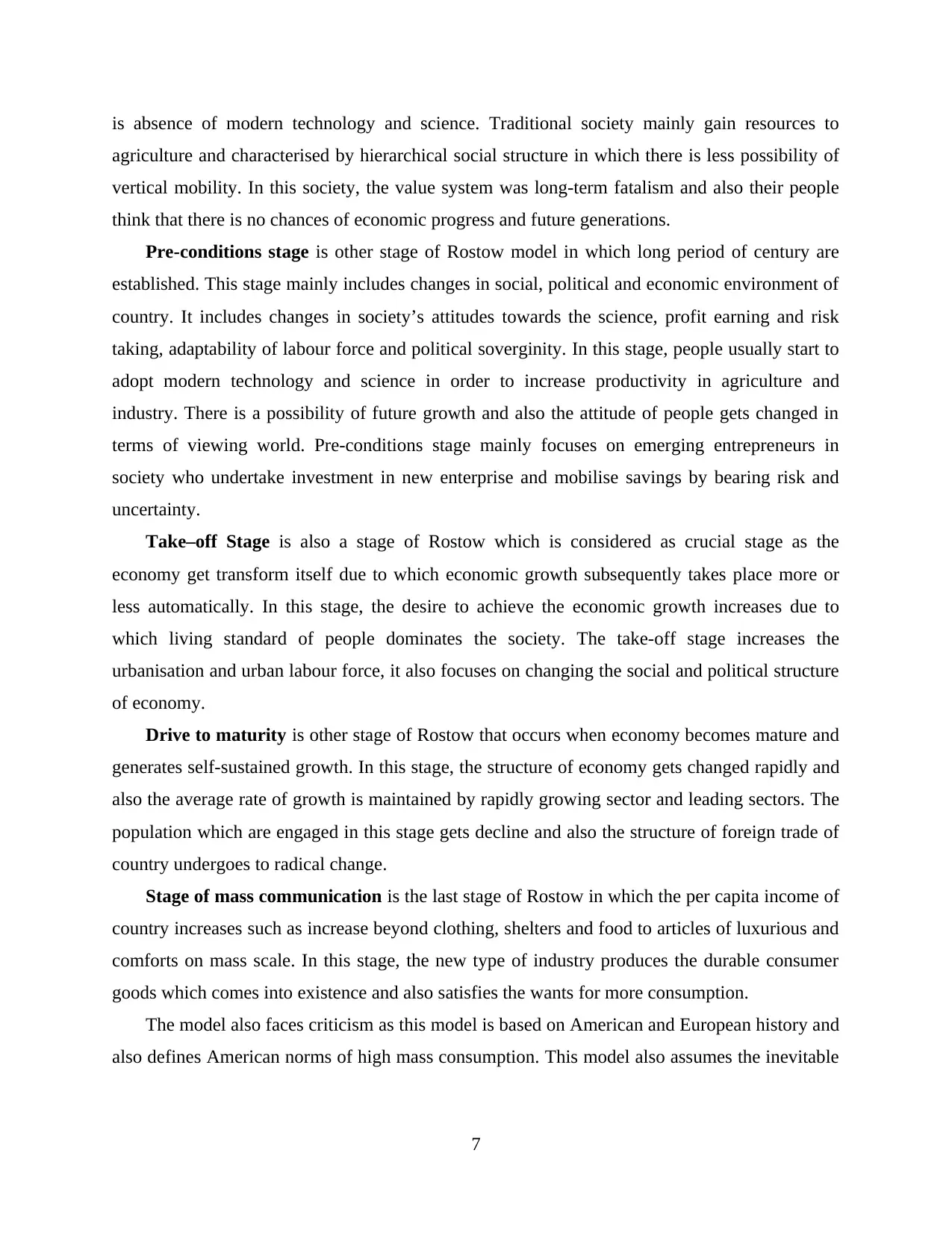
is absence of modern technology and science. Traditional society mainly gain resources to
agriculture and characterised by hierarchical social structure in which there is less possibility of
vertical mobility. In this society, the value system was long-term fatalism and also their people
think that there is no chances of economic progress and future generations.
Pre-conditions stage is other stage of Rostow model in which long period of century are
established. This stage mainly includes changes in social, political and economic environment of
country. It includes changes in society’s attitudes towards the science, profit earning and risk
taking, adaptability of labour force and political soverginity. In this stage, people usually start to
adopt modern technology and science in order to increase productivity in agriculture and
industry. There is a possibility of future growth and also the attitude of people gets changed in
terms of viewing world. Pre-conditions stage mainly focuses on emerging entrepreneurs in
society who undertake investment in new enterprise and mobilise savings by bearing risk and
uncertainty.
Take–off Stage is also a stage of Rostow which is considered as crucial stage as the
economy get transform itself due to which economic growth subsequently takes place more or
less automatically. In this stage, the desire to achieve the economic growth increases due to
which living standard of people dominates the society. The take-off stage increases the
urbanisation and urban labour force, it also focuses on changing the social and political structure
of economy.
Drive to maturity is other stage of Rostow that occurs when economy becomes mature and
generates self-sustained growth. In this stage, the structure of economy gets changed rapidly and
also the average rate of growth is maintained by rapidly growing sector and leading sectors. The
population which are engaged in this stage gets decline and also the structure of foreign trade of
country undergoes to radical change.
Stage of mass communication is the last stage of Rostow in which the per capita income of
country increases such as increase beyond clothing, shelters and food to articles of luxurious and
comforts on mass scale. In this stage, the new type of industry produces the durable consumer
goods which comes into existence and also satisfies the wants for more consumption.
The model also faces criticism as this model is based on American and European history and
also defines American norms of high mass consumption. This model also assumes the inevitable
7
agriculture and characterised by hierarchical social structure in which there is less possibility of
vertical mobility. In this society, the value system was long-term fatalism and also their people
think that there is no chances of economic progress and future generations.
Pre-conditions stage is other stage of Rostow model in which long period of century are
established. This stage mainly includes changes in social, political and economic environment of
country. It includes changes in society’s attitudes towards the science, profit earning and risk
taking, adaptability of labour force and political soverginity. In this stage, people usually start to
adopt modern technology and science in order to increase productivity in agriculture and
industry. There is a possibility of future growth and also the attitude of people gets changed in
terms of viewing world. Pre-conditions stage mainly focuses on emerging entrepreneurs in
society who undertake investment in new enterprise and mobilise savings by bearing risk and
uncertainty.
Take–off Stage is also a stage of Rostow which is considered as crucial stage as the
economy get transform itself due to which economic growth subsequently takes place more or
less automatically. In this stage, the desire to achieve the economic growth increases due to
which living standard of people dominates the society. The take-off stage increases the
urbanisation and urban labour force, it also focuses on changing the social and political structure
of economy.
Drive to maturity is other stage of Rostow that occurs when economy becomes mature and
generates self-sustained growth. In this stage, the structure of economy gets changed rapidly and
also the average rate of growth is maintained by rapidly growing sector and leading sectors. The
population which are engaged in this stage gets decline and also the structure of foreign trade of
country undergoes to radical change.
Stage of mass communication is the last stage of Rostow in which the per capita income of
country increases such as increase beyond clothing, shelters and food to articles of luxurious and
comforts on mass scale. In this stage, the new type of industry produces the durable consumer
goods which comes into existence and also satisfies the wants for more consumption.
The model also faces criticism as this model is based on American and European history and
also defines American norms of high mass consumption. This model also assumes the inevitable
7
Secure Best Marks with AI Grader
Need help grading? Try our AI Grader for instant feedback on your assignments.
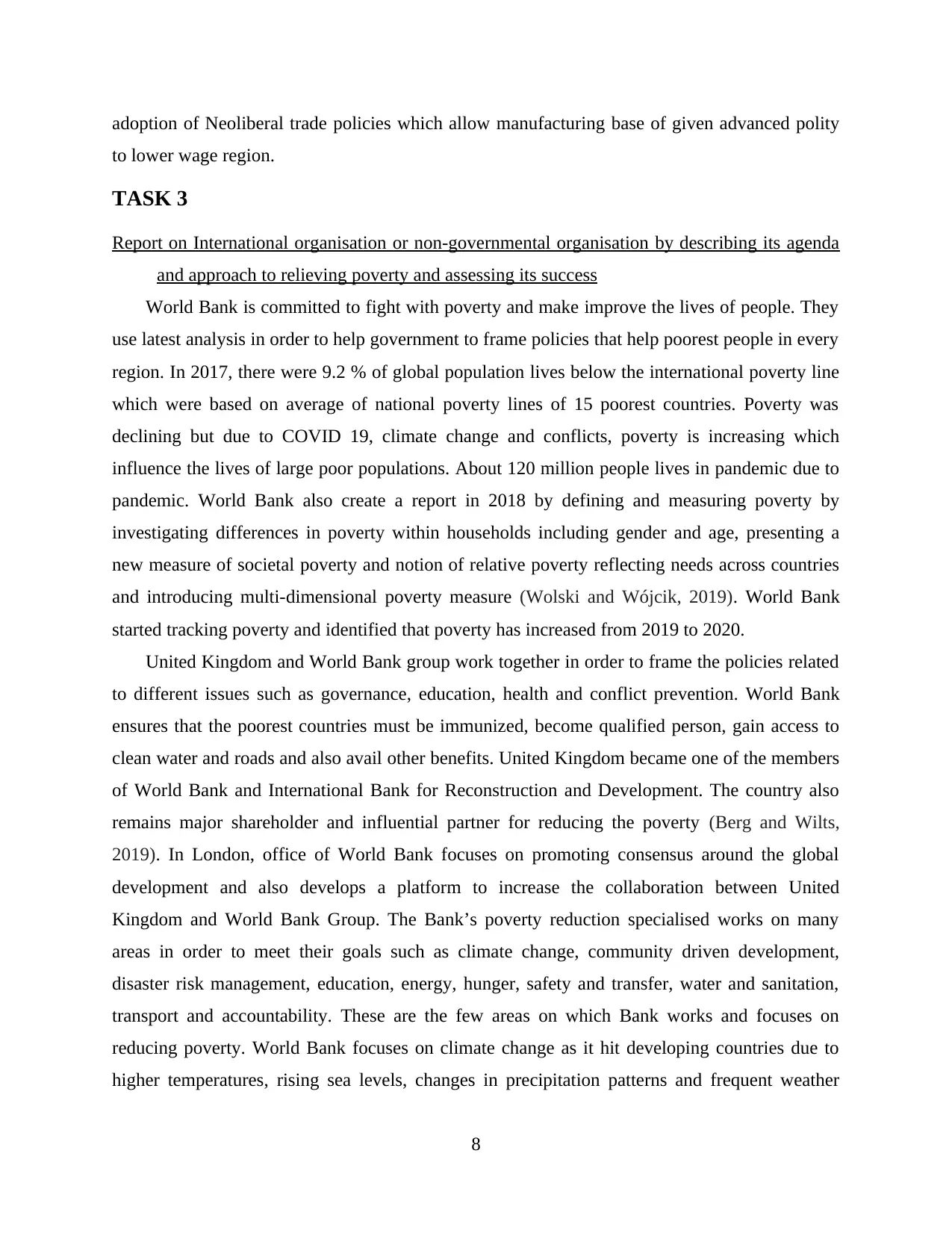
adoption of Neoliberal trade policies which allow manufacturing base of given advanced polity
to lower wage region.
TASK 3
Report on International organisation or non-governmental organisation by describing its agenda
and approach to relieving poverty and assessing its success
World Bank is committed to fight with poverty and make improve the lives of people. They
use latest analysis in order to help government to frame policies that help poorest people in every
region. In 2017, there were 9.2 % of global population lives below the international poverty line
which were based on average of national poverty lines of 15 poorest countries. Poverty was
declining but due to COVID 19, climate change and conflicts, poverty is increasing which
influence the lives of large poor populations. About 120 million people lives in pandemic due to
pandemic. World Bank also create a report in 2018 by defining and measuring poverty by
investigating differences in poverty within households including gender and age, presenting a
new measure of societal poverty and notion of relative poverty reflecting needs across countries
and introducing multi-dimensional poverty measure (Wolski and Wójcik, 2019). World Bank
started tracking poverty and identified that poverty has increased from 2019 to 2020.
United Kingdom and World Bank group work together in order to frame the policies related
to different issues such as governance, education, health and conflict prevention. World Bank
ensures that the poorest countries must be immunized, become qualified person, gain access to
clean water and roads and also avail other benefits. United Kingdom became one of the members
of World Bank and International Bank for Reconstruction and Development. The country also
remains major shareholder and influential partner for reducing the poverty (Berg and Wilts,
2019). In London, office of World Bank focuses on promoting consensus around the global
development and also develops a platform to increase the collaboration between United
Kingdom and World Bank Group. The Bank’s poverty reduction specialised works on many
areas in order to meet their goals such as climate change, community driven development,
disaster risk management, education, energy, hunger, safety and transfer, water and sanitation,
transport and accountability. These are the few areas on which Bank works and focuses on
reducing poverty. World Bank focuses on climate change as it hit developing countries due to
higher temperatures, rising sea levels, changes in precipitation patterns and frequent weather
8
to lower wage region.
TASK 3
Report on International organisation or non-governmental organisation by describing its agenda
and approach to relieving poverty and assessing its success
World Bank is committed to fight with poverty and make improve the lives of people. They
use latest analysis in order to help government to frame policies that help poorest people in every
region. In 2017, there were 9.2 % of global population lives below the international poverty line
which were based on average of national poverty lines of 15 poorest countries. Poverty was
declining but due to COVID 19, climate change and conflicts, poverty is increasing which
influence the lives of large poor populations. About 120 million people lives in pandemic due to
pandemic. World Bank also create a report in 2018 by defining and measuring poverty by
investigating differences in poverty within households including gender and age, presenting a
new measure of societal poverty and notion of relative poverty reflecting needs across countries
and introducing multi-dimensional poverty measure (Wolski and Wójcik, 2019). World Bank
started tracking poverty and identified that poverty has increased from 2019 to 2020.
United Kingdom and World Bank group work together in order to frame the policies related
to different issues such as governance, education, health and conflict prevention. World Bank
ensures that the poorest countries must be immunized, become qualified person, gain access to
clean water and roads and also avail other benefits. United Kingdom became one of the members
of World Bank and International Bank for Reconstruction and Development. The country also
remains major shareholder and influential partner for reducing the poverty (Berg and Wilts,
2019). In London, office of World Bank focuses on promoting consensus around the global
development and also develops a platform to increase the collaboration between United
Kingdom and World Bank Group. The Bank’s poverty reduction specialised works on many
areas in order to meet their goals such as climate change, community driven development,
disaster risk management, education, energy, hunger, safety and transfer, water and sanitation,
transport and accountability. These are the few areas on which Bank works and focuses on
reducing poverty. World Bank focuses on climate change as it hit developing countries due to
higher temperatures, rising sea levels, changes in precipitation patterns and frequent weather
8
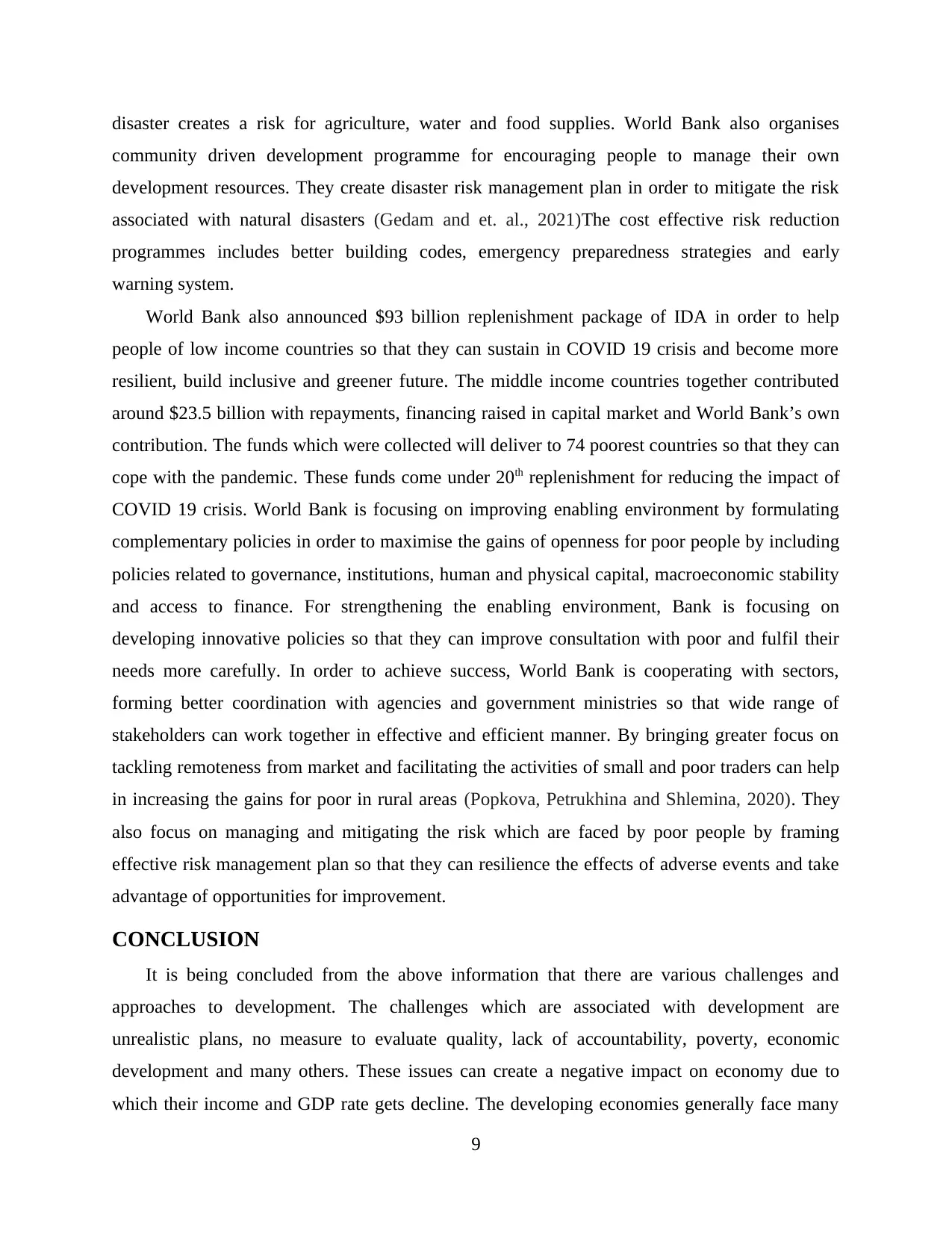
disaster creates a risk for agriculture, water and food supplies. World Bank also organises
community driven development programme for encouraging people to manage their own
development resources. They create disaster risk management plan in order to mitigate the risk
associated with natural disasters (Gedam and et. al., 2021)The cost effective risk reduction
programmes includes better building codes, emergency preparedness strategies and early
warning system.
World Bank also announced $93 billion replenishment package of IDA in order to help
people of low income countries so that they can sustain in COVID 19 crisis and become more
resilient, build inclusive and greener future. The middle income countries together contributed
around $23.5 billion with repayments, financing raised in capital market and World Bank’s own
contribution. The funds which were collected will deliver to 74 poorest countries so that they can
cope with the pandemic. These funds come under 20th replenishment for reducing the impact of
COVID 19 crisis. World Bank is focusing on improving enabling environment by formulating
complementary policies in order to maximise the gains of openness for poor people by including
policies related to governance, institutions, human and physical capital, macroeconomic stability
and access to finance. For strengthening the enabling environment, Bank is focusing on
developing innovative policies so that they can improve consultation with poor and fulfil their
needs more carefully. In order to achieve success, World Bank is cooperating with sectors,
forming better coordination with agencies and government ministries so that wide range of
stakeholders can work together in effective and efficient manner. By bringing greater focus on
tackling remoteness from market and facilitating the activities of small and poor traders can help
in increasing the gains for poor in rural areas (Popkova, Petrukhina and Shlemina, 2020). They
also focus on managing and mitigating the risk which are faced by poor people by framing
effective risk management plan so that they can resilience the effects of adverse events and take
advantage of opportunities for improvement.
CONCLUSION
It is being concluded from the above information that there are various challenges and
approaches to development. The challenges which are associated with development are
unrealistic plans, no measure to evaluate quality, lack of accountability, poverty, economic
development and many others. These issues can create a negative impact on economy due to
which their income and GDP rate gets decline. The developing economies generally face many
9
community driven development programme for encouraging people to manage their own
development resources. They create disaster risk management plan in order to mitigate the risk
associated with natural disasters (Gedam and et. al., 2021)The cost effective risk reduction
programmes includes better building codes, emergency preparedness strategies and early
warning system.
World Bank also announced $93 billion replenishment package of IDA in order to help
people of low income countries so that they can sustain in COVID 19 crisis and become more
resilient, build inclusive and greener future. The middle income countries together contributed
around $23.5 billion with repayments, financing raised in capital market and World Bank’s own
contribution. The funds which were collected will deliver to 74 poorest countries so that they can
cope with the pandemic. These funds come under 20th replenishment for reducing the impact of
COVID 19 crisis. World Bank is focusing on improving enabling environment by formulating
complementary policies in order to maximise the gains of openness for poor people by including
policies related to governance, institutions, human and physical capital, macroeconomic stability
and access to finance. For strengthening the enabling environment, Bank is focusing on
developing innovative policies so that they can improve consultation with poor and fulfil their
needs more carefully. In order to achieve success, World Bank is cooperating with sectors,
forming better coordination with agencies and government ministries so that wide range of
stakeholders can work together in effective and efficient manner. By bringing greater focus on
tackling remoteness from market and facilitating the activities of small and poor traders can help
in increasing the gains for poor in rural areas (Popkova, Petrukhina and Shlemina, 2020). They
also focus on managing and mitigating the risk which are faced by poor people by framing
effective risk management plan so that they can resilience the effects of adverse events and take
advantage of opportunities for improvement.
CONCLUSION
It is being concluded from the above information that there are various challenges and
approaches to development. The challenges which are associated with development are
unrealistic plans, no measure to evaluate quality, lack of accountability, poverty, economic
development and many others. These issues can create a negative impact on economy due to
which their income and GDP rate gets decline. The developing economies generally face many
9
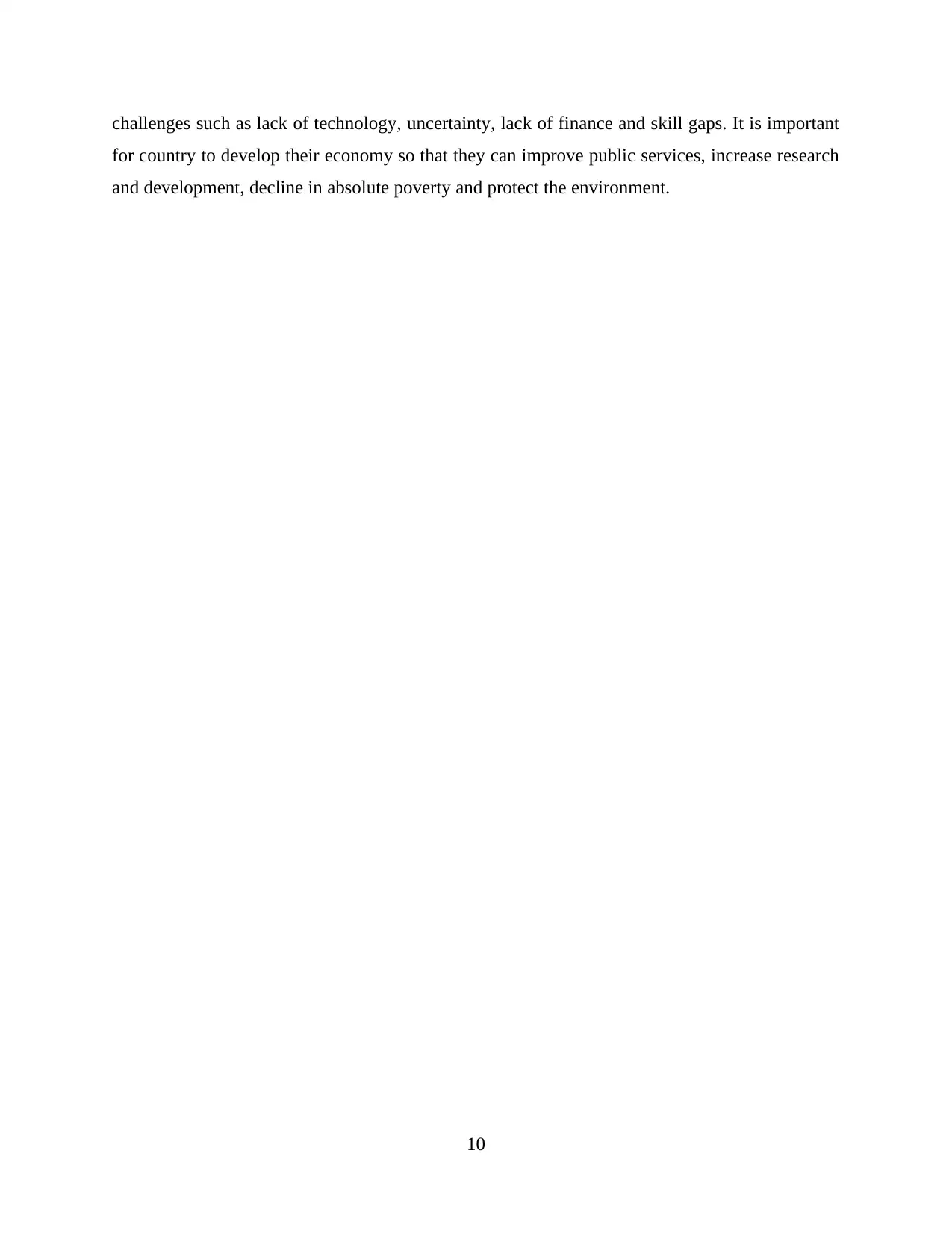
challenges such as lack of technology, uncertainty, lack of finance and skill gaps. It is important
for country to develop their economy so that they can improve public services, increase research
and development, decline in absolute poverty and protect the environment.
10
for country to develop their economy so that they can improve public services, increase research
and development, decline in absolute poverty and protect the environment.
10
Paraphrase This Document
Need a fresh take? Get an instant paraphrase of this document with our AI Paraphraser
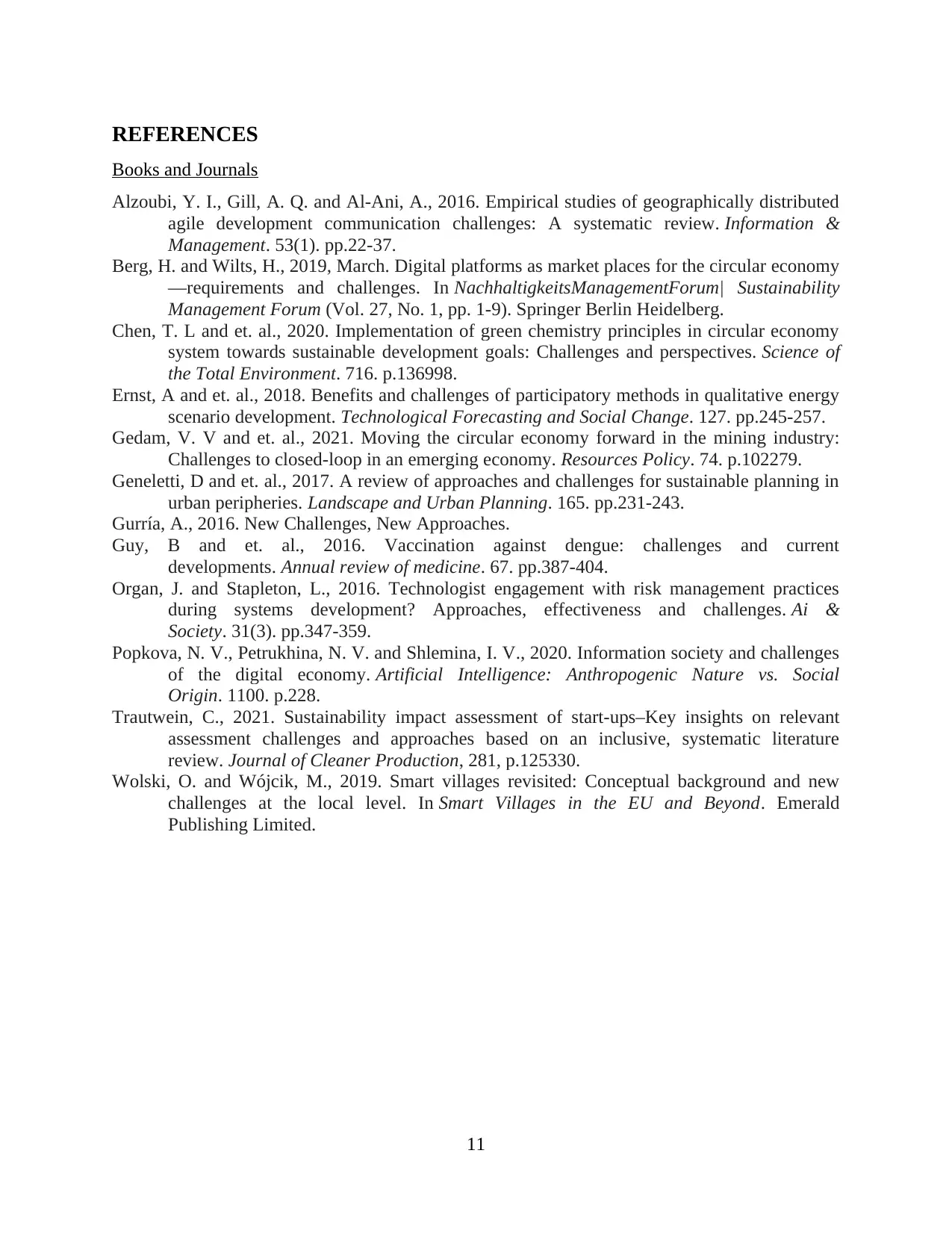
REFERENCES
Books and Journals
Alzoubi, Y. I., Gill, A. Q. and Al-Ani, A., 2016. Empirical studies of geographically distributed
agile development communication challenges: A systematic review. Information &
Management. 53(1). pp.22-37.
Berg, H. and Wilts, H., 2019, March. Digital platforms as market places for the circular economy
—requirements and challenges. In NachhaltigkeitsManagementForum| Sustainability
Management Forum (Vol. 27, No. 1, pp. 1-9). Springer Berlin Heidelberg.
Chen, T. L and et. al., 2020. Implementation of green chemistry principles in circular economy
system towards sustainable development goals: Challenges and perspectives. Science of
the Total Environment. 716. p.136998.
Ernst, A and et. al., 2018. Benefits and challenges of participatory methods in qualitative energy
scenario development. Technological Forecasting and Social Change. 127. pp.245-257.
Gedam, V. V and et. al., 2021. Moving the circular economy forward in the mining industry:
Challenges to closed-loop in an emerging economy. Resources Policy. 74. p.102279.
Geneletti, D and et. al., 2017. A review of approaches and challenges for sustainable planning in
urban peripheries. Landscape and Urban Planning. 165. pp.231-243.
Gurría, A., 2016. New Challenges, New Approaches.
Guy, B and et. al., 2016. Vaccination against dengue: challenges and current
developments. Annual review of medicine. 67. pp.387-404.
Organ, J. and Stapleton, L., 2016. Technologist engagement with risk management practices
during systems development? Approaches, effectiveness and challenges. Ai &
Society. 31(3). pp.347-359.
Popkova, N. V., Petrukhina, N. V. and Shlemina, I. V., 2020. Information society and challenges
of the digital economy. Artificial Intelligence: Anthropogenic Nature vs. Social
Origin. 1100. p.228.
Trautwein, C., 2021. Sustainability impact assessment of start-ups–Key insights on relevant
assessment challenges and approaches based on an inclusive, systematic literature
review. Journal of Cleaner Production, 281, p.125330.
Wolski, O. and Wójcik, M., 2019. Smart villages revisited: Conceptual background and new
challenges at the local level. In Smart Villages in the EU and Beyond. Emerald
Publishing Limited.
11
Books and Journals
Alzoubi, Y. I., Gill, A. Q. and Al-Ani, A., 2016. Empirical studies of geographically distributed
agile development communication challenges: A systematic review. Information &
Management. 53(1). pp.22-37.
Berg, H. and Wilts, H., 2019, March. Digital platforms as market places for the circular economy
—requirements and challenges. In NachhaltigkeitsManagementForum| Sustainability
Management Forum (Vol. 27, No. 1, pp. 1-9). Springer Berlin Heidelberg.
Chen, T. L and et. al., 2020. Implementation of green chemistry principles in circular economy
system towards sustainable development goals: Challenges and perspectives. Science of
the Total Environment. 716. p.136998.
Ernst, A and et. al., 2018. Benefits and challenges of participatory methods in qualitative energy
scenario development. Technological Forecasting and Social Change. 127. pp.245-257.
Gedam, V. V and et. al., 2021. Moving the circular economy forward in the mining industry:
Challenges to closed-loop in an emerging economy. Resources Policy. 74. p.102279.
Geneletti, D and et. al., 2017. A review of approaches and challenges for sustainable planning in
urban peripheries. Landscape and Urban Planning. 165. pp.231-243.
Gurría, A., 2016. New Challenges, New Approaches.
Guy, B and et. al., 2016. Vaccination against dengue: challenges and current
developments. Annual review of medicine. 67. pp.387-404.
Organ, J. and Stapleton, L., 2016. Technologist engagement with risk management practices
during systems development? Approaches, effectiveness and challenges. Ai &
Society. 31(3). pp.347-359.
Popkova, N. V., Petrukhina, N. V. and Shlemina, I. V., 2020. Information society and challenges
of the digital economy. Artificial Intelligence: Anthropogenic Nature vs. Social
Origin. 1100. p.228.
Trautwein, C., 2021. Sustainability impact assessment of start-ups–Key insights on relevant
assessment challenges and approaches based on an inclusive, systematic literature
review. Journal of Cleaner Production, 281, p.125330.
Wolski, O. and Wójcik, M., 2019. Smart villages revisited: Conceptual background and new
challenges at the local level. In Smart Villages in the EU and Beyond. Emerald
Publishing Limited.
11
1 out of 11
![[object Object]](/_next/static/media/star-bottom.7253800d.svg)





